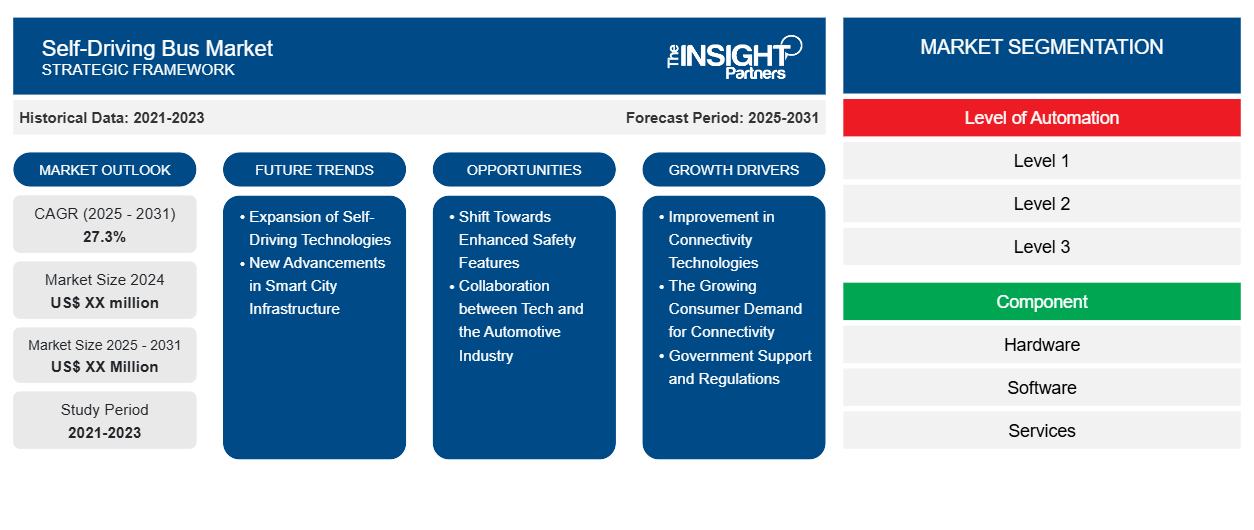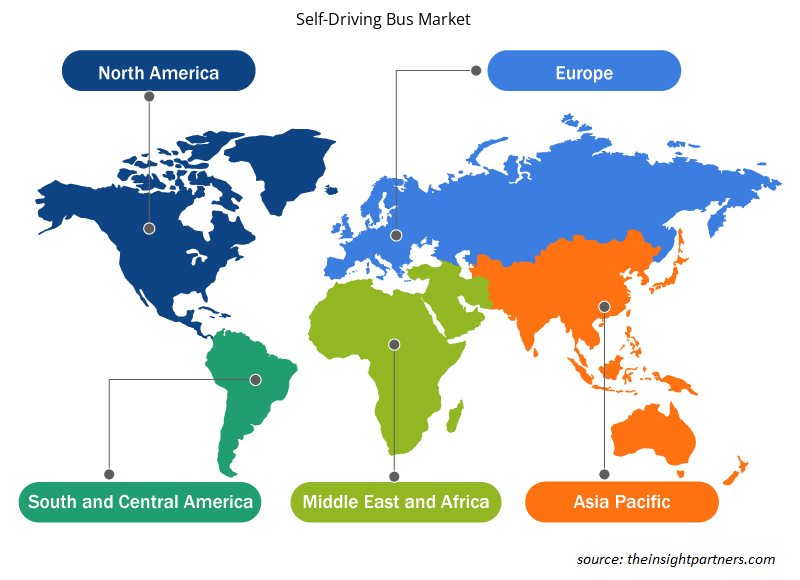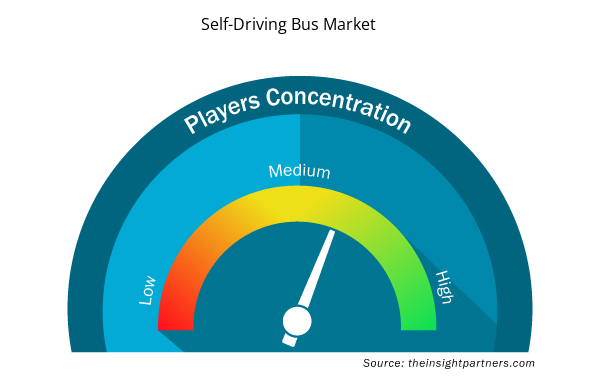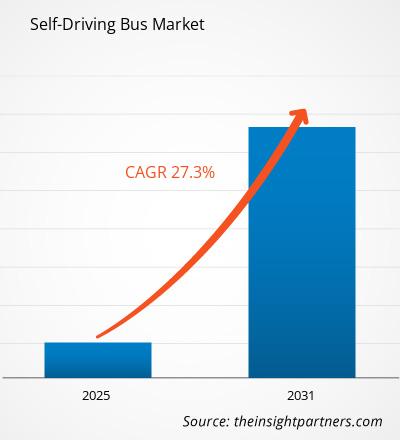The Self-Driving Bus Market is expected to register a CAGR of 27.3% from 2025 to 2031, with a market size expanding from US$ XX million in 2024 to US$ XX Million by 2031.
The report is segmented by Level of Automation (Level 1, Level 2, Level 3, Level 4, Level 5); Component (Hardware, Software, Services). The global analysis is further broken-down at regional level and major countries. The Report Offers the Value in USD for the above analysis and segments.
Purpose of the Report
The report Self-Driving Bus Market by The Insight Partners aims to describe the present landscape and future growth, top driving factors, challenges, and opportunities. This will provide insights to various business stakeholders, such as:
- Technology Providers/Manufacturers: To understand the evolving market dynamics and know the potential growth opportunities, enabling them to make informed strategic decisions.
- Investors: To conduct a comprehensive trend analysis regarding the market growth rate, market financial projections, and opportunities that exist across the value chain.
- Regulatory bodies: To regulate policies and police activities in the market with the aim of minimizing abuse, preserving investor trust and confidence, and upholding the integrity and stability of the market.
Self-Driving Bus Market Segmentation
Level of Automation
- Level 1
- Level 2
- Level 3
- Level 4
- Level 5
Component
- Hardware
- Software
- Services
Customize This Report To Suit Your Requirement
You will get customization on any report - free of charge - including parts of this report, or country-level analysis, Excel Data pack, as well as avail great offers and discounts for start-ups & universities
Self-Driving Bus Market: Strategic Insights

- Get Top Key Market Trends of this report.This FREE sample will include data analysis, ranging from market trends to estimates and forecasts.
Self-Driving Bus Market Growth Drivers
- Improvement in Connectivity Technologies: Growth in the Self-Driving Bus Market is being fuelled by the rapid advancement of connectivity technologies, including 4G, LTE, and soon to be followed by 5G networks. These improvements allow vehicles to communicate with each other and with infrastructure in order to have a better driving experience, ensure safety, and navigate roads.
- The Growing Consumer Demand for Connectivity: There is an increasing trend of consumers' preferences in vehicles with connectivity technologies. The vehicles that are equipped with high connectivity options have gained wide acceptance among the customers. It is seen that the drivers seek in-vehicle entertainment, navigation, and safety solutions that rely on real-time data and internet connectivity.
- Government Support and Regulations: Many governments around the globe are investing in smart city initiatives and proffering favorable regulations to support autonomous vehicles. Policies that create a conducive environment for innovation, especially in transportation technologies and self-driving buses, enhance the growth of the market and further infrastructure for autonomous solutions.
Self-Driving Bus Market Future Trends
- Expansion of Self-Driving Technologies: Combining connected vehicles technologies with autonomous driving systems can open the floodgates of new opportunities. As the industry starts getting into fully autonomous vehicles, there would be a growing need for good connectivity solutions. This would empower more secure and efficient traveling times. Organizations making investments in this space could take advantage of the rapidly escalating trend towards automation.
- New Advancements in Smart City Infrastructure:The connected buses promises the city bright opportunities in interaction with the urban infrastructure. Such infrastructure encompasses traffic management systems, parking solutions, and transport networks of public road vehicles. Cooperation between automotive manufacturers and city planners may lead to new solutions directed at making mobility for people in a city better and un-congested.
Self-Driving Bus Market Opportunities
- Shift Towards Enhanced Safety Features: Better Safety Feature Trends-Increased Depolyment of Advanced Safety Solutions in Connected Vehicles Improved safety features are an absolute trend. Collision Avoidance systems, real-time traffic conditions, and emergency response capabilities automatically become standard fitments in new models. These will ensure that there is better compliance with regulation and consumer concerns, which drives much wider adoption in connected technologies.
- Collaboration between Tech and the Automotive Industry: There is a growing trend of collaboration between technology firms and automotive manufacturers to develop autonomous driving systems for buses. Companies such as Waymo, Tesla, and traditional bus manufacturers are working together to speed up the deployment of self-driving buses and push the limits of vehicle automation.
Self-Driving Bus Market Regional Insights
The regional trends and factors influencing the Self-Driving Bus Market throughout the forecast period have been thoroughly explained by the analysts at Insight Partners. This section also discusses Self-Driving Bus Market segments and geography across North America, Europe, Asia Pacific, Middle East and Africa, and South and Central America.

- Get the Regional Specific Data for Self-Driving Bus Market
Self-Driving Bus Market Report Scope
| Report Attribute | Details |
|---|---|
| Market size in 2024 | US$ XX million |
| Market Size by 2031 | US$ XX Million |
| Global CAGR (2025 - 2031) | 27.3% |
| Historical Data | 2021-2023 |
| Forecast period | 2025-2031 |
| Segments Covered |
By Level of Automation
|
| Regions and Countries Covered | North America
|
| Market leaders and key company profiles |
Self-Driving Bus Market Players Density: Understanding Its Impact on Business Dynamics
The Self-Driving Bus Market market is growing rapidly, driven by increasing end-user demand due to factors such as evolving consumer preferences, technological advancements, and greater awareness of the product's benefits. As demand rises, businesses are expanding their offerings, innovating to meet consumer needs, and capitalizing on emerging trends, which further fuels market growth.
Market players density refers to the distribution of firms or companies operating within a particular market or industry. It indicates how many competitors (market players) are present in a given market space relative to its size or total market value.
Major Companies operating in the Self-Driving Bus Market are:
- AB Volvo
- LILEE Systems
- Daimler AG
- Hino Motors, Ltd.
- EasyMile
Disclaimer: The companies listed above are not ranked in any particular order.

- Get the Self-Driving Bus Market top key players overview
Key Selling Points
- Comprehensive Coverage: The report comprehensively covers the analysis of products, services, types, and end users of the Self-Driving Bus Market, providing a holistic landscape.
- Expert Analysis: The report is compiled based on the in-depth understanding of industry experts and analysts.
- Up-to-date Information: The report assures business relevance due to its coverage of recent information and data trends.
- Customization Options: This report can be customized to cater to specific client requirements and suit the business strategies aptly.
The research report on the Self-Driving Bus Market can, therefore, help spearhead the trail of decoding and understanding the industry scenario and growth prospects. Although there can be a few valid concerns, the overall benefits of this report tend to outweigh the disadvantages.
- Historical Analysis (2 Years), Base Year, Forecast (7 Years) with CAGR
- PEST and SWOT Analysis
- Market Size Value / Volume - Global, Regional, Country
- Industry and Competitive Landscape
- Excel Dataset



Report Coverage
Revenue forecast, Company Analysis, Industry landscape, Growth factors, and Trends

Segment Covered
This text is related
to segments covered.

Regional Scope
North America, Europe, Asia Pacific, Middle East & Africa, South & Central America

Country Scope
This text is related
to country scope.
Frequently Asked Questions
Some of the customization options available based on the request are an additional 3-5 company profiles and country-specific analysis of 3-5 countries of your choice. Customizations are to be requested/discussed before making final order confirmation, as our team would review the same and check the feasibility.
The report can be delivered in PDF/PPT format; we can also share excel dataset based on the request.
The leading players operating in the Self-Driving Bus Market include AB Volvo, LILEE Systems, Daimler AG, Hino Motors, Ltd., EasyMile, Navya, Proterra, Volkswagen Group, and Rivian
The Self-Driving Bus Market is estimated to witness a CAGR of 27.3% from 2023 to 2031
Shift Towards Enhanced Safety Features is the key future trend of the Self-Driving Bus Market
The major factors driving the Self-Driving Bus Market are:Technological Advancements#Increasing Consumer Demand for Connectivity
Trends and growth analysis reports related to Automotive and Transportation : READ MORE..
1.AB Volvo
2.LILEE Systems
3.Daimler AG
4.Hino Motors, Ltd.
5.EasyMile
6.Navya
7.Proterra
8.Volkswagen Group
9.Rivian
10.New Flyer (NFI Group Inc.)

 Get Free Sample For
Get Free Sample For